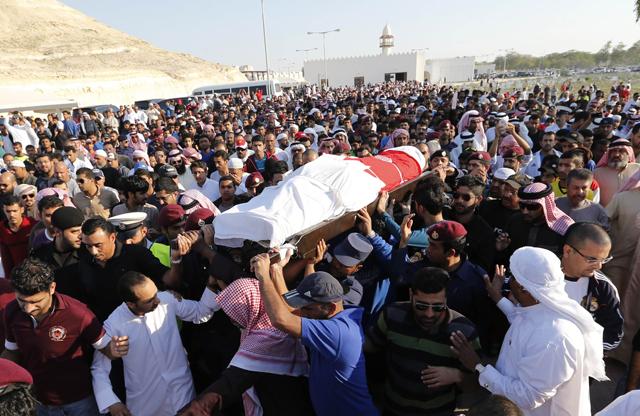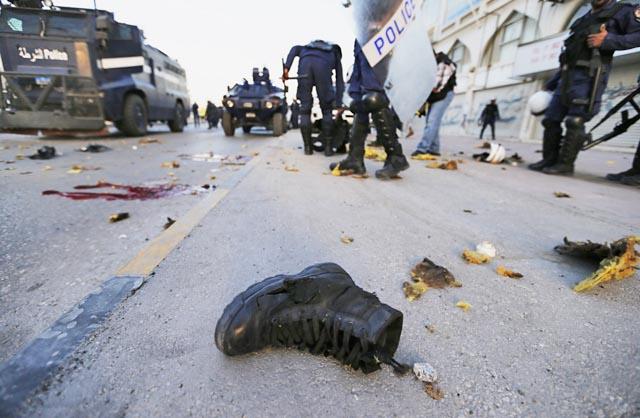MANAMA — Tens of thousands of Bahrainis joined a peaceful demonstration on Saturday to mark the third anniversary of an abortive pro-democracy uprising led by majority Shiite Muslims.
The rally organised by the kingdom’s main opposition Al Wefaq movement was one of the biggest staged since 2011.
Vast crowds of men, women and children took to the streets of the small Gulf Arab nation calling for democracy, political reform and the release of political prisoners, witnesses said.
“We will not stop until we achieve our demands,” protesters shouted. “Shiites and Sunnis, we all love this country.”
Police could not be seen at the rally on Budaiya Highway, which links the capital Manama to the northwestern town of Budaiya, witnesses said. No clashes were reported.
The interior ministry said a policeman had died after being wounded by a “terrorist” blast on Friday. Three other policemen were wounded the same day, while 26 people had been arrested.
“Some villages saw rioting, vandalism and the targeting of policemen,” the ministry said, referring to Friday’s unrest.
Bahrain, with Saudi help, crushed the demonstrations that began on February 14, 2011 inspired by Arab uprisings elsewhere, but has yet to resolve the conflict between majority Shiites and the Sunni-led monarchy they accuse of oppressing them.
The ruling family has launched a third round of dialogue with its opponents, but no political agreement is in sight.
The Bahraini authorities, along with their Saudi backers, view Shiite demands for political reform as Iranian-inspired subversion. Their handling of the unrest has embarrassed the United States, which has had to balance its support for an ally that hosts its Fifth Fleet against human rights concerns.
“Three years since the start of the protests, we have seen no peace,” said a 34-year-old clerk in Saar village who gave his name only as Abu Ali. “Every day...youngsters go out and burn tyres on the roads and the police attack them with tear gas.”
UN Secretary General Ban Ki-moon said he was concerned about reports of clashes between demonstrators and security forces on Friday, and urged the authorities to act in strict accordance with their international human rights obligations.
‘Unprovoked attacks’
In response, the interior ministry said the constitution guaranteed the right to peaceful protest and assembly and that numerous peaceful rallies and protests had taken place in the past week without police interference, but added: “Over the past two days there have been a series of unprovoked attacks on police by groups who use urban guerrilla warfare tactics. This includes the use of deadly homemade weapons and the detonation of two bombs... When they use force it is done in a proportionate and necessary manner.”
Crown Prince Sheikh Salman Bin Hamad Al Khalifa, a relative moderate in the Sunni Al Khalifa family that has ruled Bahrain for more than 200 years, stepped in last month to try to revive a dialogue that the opposition had boycotted for four months.
Royal Court Minister Sheikh Khaled Bin Ahmed Al Khalifa has since met opposition leaders and other figures, but formal talks have yet to resume and the two sides still seem far apart.
The opposition had boycotted the talks after the government investigated at least two of its leaders on incitement charges.
Concern is rising that young Shiites will resort more and more to violent militancy if mainstream opposition leaders fail to advance a political settlement that would give Shiites a bigger say in government and improve living conditions.
A tiny Gulf archipelago of 1.7 million people, Bahrain has been in turmoil since the original revolt. The government says it has implemented some reforms recommended by international investigators and that it is willing to discuss further demands.
Shiites want wider-ranging democratisation, entailing Cabinets chosen by an elected parliament rather than appointed exclusively by the king. They also call for an end to alleged discrimination in jobs, housing and other benefits. The government denies any policy of marginalising Shiites.


















